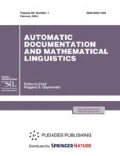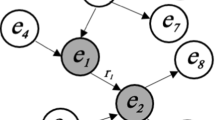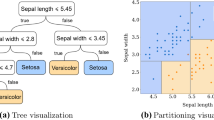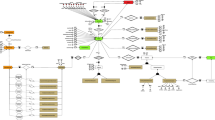Abstract
Statements of the major tasks of inductive formation of knowledge are suggested. These are classifications and clusterings, which are part of machine learning and are applied for dependence models with parameters that are not flawed in their traditional statement. An algorithm for knowledge base formation is presented for learning samples in almost real-life ontologies of medical diagnosis.
Similar content being viewed by others
References
Kleschev, A.S. and Smagin, S.V., The Organization of Machine Experiments in Inductive Formation of Knowledge, NTI. Ser. 2, 2008, vol. 1, pp. 16–24.
Kleschev, A.S. and Smagin, S.V., Organizatsiya kompjuternykh eksperimentov po induktivnomu formirovaniyu znaniy (Organization of Machine Experiments in Inductive Formation of Knowledge), Vladivostok: Institute for Automation and Control Processes of the Far Eastern Department of the Russian Academy of Sciences, 2007; http://iacp.dvo.ru/is/publications/2007-Kleschev,Smagin-Organizing.pdf
Kleschev, A.S. and Smagin, S.V., A General Approach to Machine Experiments in Inductive Formation of Knowledge, Program. Produkty Sist., 2008, vol. 1, pp. 56–58. http://www.swsys.ru/index.php?page = article&id = 101
Kleschev, A.S. and Smagin, S.V., An Experimental Study of the Properties of the Monte-Carlo Method for Inductive Formation of Knowledge in Terms of a Simplified Ontology of Medical Diagnosis, NTI. Ser. 2, 2009, vol. 7, pp. 12–23.
Kleschev, A.S. and Smagin, S.V., Some Properties of the Method of Random Bound of the Dynamics Periods, Inform. Sist. Upr., 2009, vol. 19,issue 1, pp. 103–115.
Kleschev, A.S. and Smagin, S.V., Kompyuternyi eksperiment po issledovaniyu svoistv metoda sluchainoi rasstanovki granits periodov dinamiki (Machine Experiment in the Research of the Properties of the Method of Random Bound of the Dynamics Periods), Vladivostok: Institute for Automation and Control Processes of the Far Eastern Department of the Russian Academy of Sciences, 2009. http://iacp.dvo.ru/is/publications/2009-Kleschev,Smagin-ExperOne.pdf
Zagoruiko, N.G., Prikladnye metody analiza dannykh i znanii (Application Methods for Data and Knowledge Analysis), Novosibirsk: Inst.Matem., 1999.
Lbov, G.S. and Berikov, V.B., Ustoichivost’ reshayuschikh funktsii v zadachakh raspoznavaniya obrazov i analiza raznotipnoi informatsii, (Stability of Defining Functions in Image Recognition and Analysis of Heterogeneous Information), Novosibirsk: Inst. Matem., 2005.
Finn, V.K., Expert Systems and Some Problems of their Intellectualization, in Intellektual’nye sistemy i obshestvo (Intelligent Systems and Society), Moscow: Russian State Humanitarian Univ., 2000, pp. 58–90.
Professional Informational and Analytical Resource on Machine Learning, Image Recognition and Intelligent Data Analysis. http://machinelearning.ru/
Kleschev, A.S., Problems of Inductive Formation of Knowledge in Terms of Non-Primitive Ontologies of Object Domains, NTI. Ser. 2, 2003, vol. 8, pp. 8–18.
Kleschev, A.S. and Artemeva, I.L., Unenriched Logical Relationship Systems. Part 1–2, NTI. Ser. 2, 2000, vol. 7, pp. 18–28, vol. 8, pp. 8–18.
Poligon: a System of Mass Testing of Classification Algorithms as Applied in Actual Tasks. http://Poligon.MachineLearning.ru/
Kleschev, A.S. and Smagin, S.V., On the Role of Internal and External Evaluations of the Properties of the Methods of Inductive Formation of Knowledge, NTI. Ser. 2, 2011, vol. 4, pp. 22–35.
Kleschev, A.S. and Smagin, S.V., O roli vneshnikh i vnutrennikh otsenok svoistv metodov induktivnogo formirovaniya znanii (On the Role of Internal and External Evaluations of the Properties of the Methods of Inductive Formation of Knowledge), Vladivostok: Institute for Automation and Control Processes of the Far Eastern Department of the Russian Academy of Sciences, 2010. http://iacp.dvo.ru/is/publications/2010-Kleschev,Smagin-ExperTwo.pdf
Kleschev, A.S., Moskalenko, F.M., and Chernyakhovskaya, M.Yu., Ontologiya i model’ ontologii predmetnoi oblasti “Meditsinskaya diagnostika” (Ontology and Ontology Model in Medical Diagnostics), Vladivostok: Institute for Automation and Control Processes of the Far Eastern Department of the Russian Academy of Sciences, 2005.
Kleschev, A.S. and Smagin, S.V., Algoritm formirovaniya baz znanii po obuchayushim vyborkam dlya ontologii meditsinskoi diagnostiki, priblizhennoi k real’noi (Algorithm for Knowledge Bases Formation Using Learning Samples in Almost Real-Life Ontology of Medical Diagnosis), Vladivostok: Institute for Automation and Control Processes of the Far Eastern Department of the Russian Academy of Sciences, 2011. http://iacp.dvo.ru/is/publications/2011-Kleschev,Smagin-ExperThree.pdf
Author information
Authors and Affiliations
Corresponding author
Additional information
Original Russian Text © A.S. Kleschev, S.V. Smagin, 2012, published in Nauchno-Tekhnicheskaya Informatsiya, Seriya 2, 2012, No. 1, pp. 9–21.
About this article
Cite this article
Kleschev, A.S., Smagin, S.V. Problems of inductive formation of knowledge in the ontology of medical diagnosis. Autom. Doc. Math. Linguist. 46, 8–21 (2012). https://doi.org/10.3103/S0005105512010037
Received:
Published:
Issue Date:
DOI: https://doi.org/10.3103/S0005105512010037
Keywords
- machine learning
- inductive formation of knowledge
- task of classification
- a dependence model with parameters
- an easily interpreted dependence model
- a learning algorithm
- an experimental study of properties
- model data
- evaluation of internal properties
- evaluation of external properties
- ontologies of medical diagnosis




